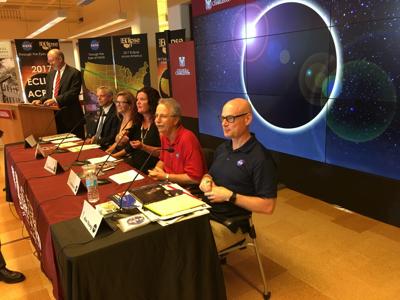Experiencing a total solar eclipse is like abruptly finding yourself on an alien planet.
That an overreach? Tell it to NASA solar astrophysicist Alex Young.
"Put your cameras down and enjoy it," Young said during a news conference Friday at the College of Charleston. "It's a visceral human experience. Take the experience in."
A total solar eclipse, when the moon completely obscures the sun as they cross in the sky, will be visible over a swath of the United States on Monday, including the middle section of South Carolina. The supra spectacle will cross the country as fast as a speeding bullet — 1,500 mph.
In the Charleston region, it will be visible beginning just after 2:40 p.m. and last only about a minute and a half.
Within 30 seconds, day will change to night, said Paul Hertz, NASA astrophysics division director. Among other weird effects are shadow bands that roll across the ground ahead of it and Bailey's beads — diamond-like flares of light from the moon's edge as the the sun beams through mountain horizon.
The eclipse is one of the few celestial phenomena that come to the observer rather than the observer having to find it, said Jon Hakkila, an astronomy professor at the college.
NASA will be pulling out the works in Charleston for the big show. A broadcast headquarters will be set up in a quad on the college campus to air the event live, with feeds from other locations across the country, including from observation balloons 100,000 feet in the air, as well as three telescopes and the International Space Station.
The effort is a public display of expertise, technology and advances at a time when scientific research has been derided and federal science agency budgets challenged. Among other locations, the broadcast will be aired at Times Square in New York City.
"It's an opportunity to use our resources, our connections with all our partners. It's an educational effort, and it really promotes the science that is available, that we are using, including citizen science," Young said.







